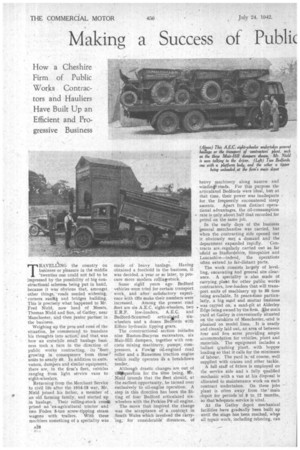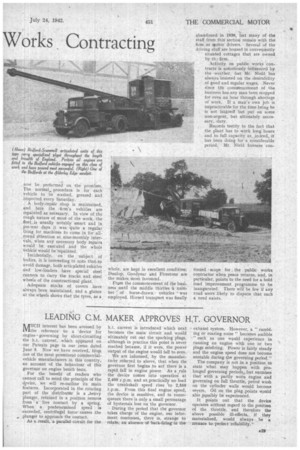Making a Success of Public Works Contracting
Page 30

Page 31

If you've noticed an error in this article please click here to report it so we can fix it.
How a Cheshire Firm of Public Works Contractors and Hauliers Have Built Up an Efficient and Progressive Business
TRAVELLING the country on business or pleasure in the middle 'twenties one could not fail to be impressed by the possibility of big constructional schemes being put in hand, because it was obvious that, amongst other things, .roads needed widening, corners easilkg and bridges building. This is precisely what happened to Mr.
• Fred Nield, now head of Messrs. Thomas Nield and Son, of Gatley, near Manchester, and -then junior partner in the business.
Weighing up the pros and cons of the • situation, he commenced to translate his thoughts into action," and that was how an erstwhile small haulage business took a turn in the direction of public works contracting, its "fleet • growing in consequence from three "' units to nearly 40. In addition to excavators, dumpers and similar equipment, there are, in the firm's fleet, vehicles ranging from light service vans to eight-wheelers.
Returning from the Merchant Service to civil life after the 1914-18 war, Mr.
Nield joined his father, a member of .
an old farming family, and started up in haulage. Their rolling-stock con* prised an "ex-agricultural tractor and two Foden 5-ton screw-tipping steam wagons with trailers. With these machines something of a speciality was made of heavy haulage. Having obtained a foothold in the business, it was decided, a year or so later, to procure more modern rolling-stock.
Some eight years ago Bedford vehicles were tried for certain transport work, and after satisfactory experience With tits make their numbers were increased. Among the present road fleet are six A.E.C. eight-wheelers, two E.R.F. low-loaders, A.E.C. and Bedford-Scammell articul4ed sixwheelers and a dozen Bedrords with Edbro hydraulic tipping gears, The constructional section includes nine Ruston-Bucyrus excavators, six Muir-Hill dumpers, together with concrete mixing machinery, pumps. compressors, a Fowl gr oil-engined road roller and a Ransomes traction engine which really operates a's a breakdown tender.
Although drastic changes are out of tifequestiort for the time being, Mr. Nield intends that the fleet should, at the earliest opportunity, be turned over exclusively to oil-engine operation. A step in this direction has been the fitting of four Bedford articulated sixwheelers with the Perkins P6 oil engine..
The move that inspired the change was the acceptance of a contract in South Wales which involved the carrying, for considerable' distances, of heavy machinery along narrow and' windine roads. For this purpose the articulated Bedfords were ideal, but at that time, their power was inadequate for the frequently encountered steep
ascents. Apart from distinct operational advantages, the oil-consumption rate is only about hall that recorded for petrol on the Same job.
In the early days of the business general merchandise was carried, but when the contracting side opened out it obviously met a demand and the
department expanded rapidly. Contracts are, regularly carried out as, far afield as Staffordshire, Shropshire and Lancashire—indeed, the operations often extend to far-distant parts.
The work consists largely of levelling, excavating and general site clearance. A speciality is also made of carrying plant for other public works contractors, low-loaders that will transport units of machinery up to 30 tons being available. In peace-rtime particularly, a big sand and mortar business was carried on, a sand-pit at Alderley Edge being owned by the firm. Vie main yard at Galley is conveniently situated on the outskirts of Manchester, sand is planned on model lines. It is neatly and cleanly laid out, an area of between four and five acres providing ample accommodation for vehicles, plant and materials. The equipment includes a ballast cirushing plant,, with hopper loading so that it calls for the minimum of labour. The yard is, of course, well supplied with cranes and other tackle.
A full staff of fitters is employed on the service side and a fully qualified mechanic with a van at his disposal is allocated to maintenance work on each contract undertaken. On these jobs plant is often away from the main depot for periods of 9 to 12 months, so that'adequate service is vital.
At the Galley depot mechanical facilities have gradually been built up until the stage has been reached, whyi all repair work, including reboring, can , now be performed on the premises. The normal procedure is for each vehicle to be washed, greased and inspected every Saturday.
A body-repair shop is maintained, and here the•firm's vehicles are repainted as neeessary. In view of the rough nature of most of the work, the fleet_ is usually notably smart and in pre-war days it was quite a regular thing for machines to come in for all. round attention at nine-monthly intervals, when any necessary body repairs would be: executed and the whole vehicle would be-repainted.
Incidentally, on the subject of bodies, it is interesting to note that_to avoid damage, both articulated vehicles and low-loaders have special steel runners to Carry the tracks and steel wheels of the constructional plant.
Adequate stocks of covers have always been maintained, and a glance at the wheels shows that the tyres, as a
whole, are kept in excellent condition; Dunlop. Goodyear and Firestone are the makes, most favoured.
From the commencement of the bust. ness until the middle thirties a number of horse-drawn vehicles was employed. Horsed transport was finally
abandoned in 1935, but many of the staff from this Section remain with the firm as notor drivers. Several of the driving staff-are housed in conveniently
situated cottages that are owned by th.-..• firm.
Activity on public works contracts is notoriously influenced by the weather, but Mr. Nield has always insisted on the desirability of good and regular wages. Never since tlfe commencement of the business has any man been stopped for even an hour through shortage of work. If a man's own job is impracticable for the time being he is not laidAniT but put on some non-urgent, but ultimately neces. sary, duty.
Records testify to the fact that the plant has to work long hours and to full capacity as, indeed, it has been doing for a considerable period: Mr. Nield foresees con tinned scope for the public works contractor when peace returns, and, in particular, points to the need for a bold road improvement programme to be inaugurated. There will be few if any road users likely to dispute that such a need exists.




















































